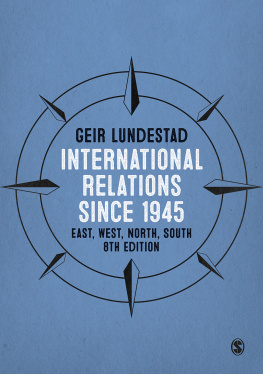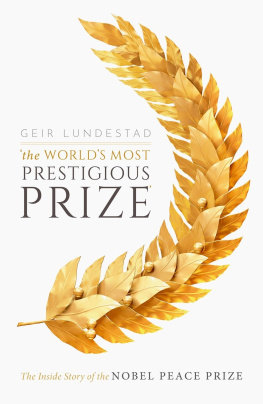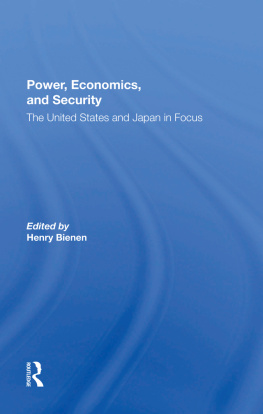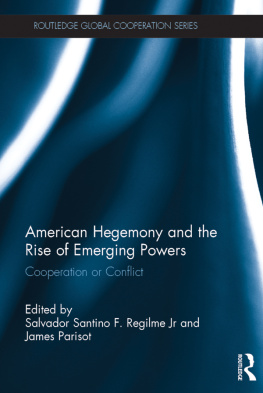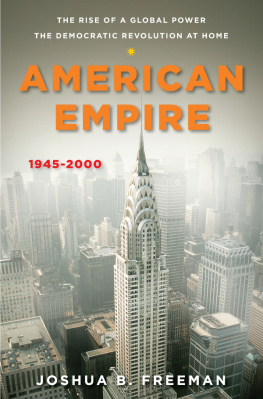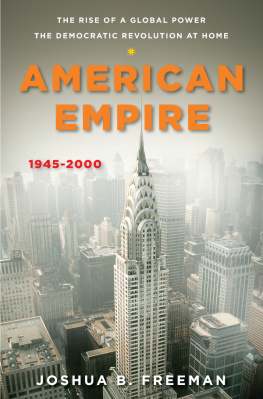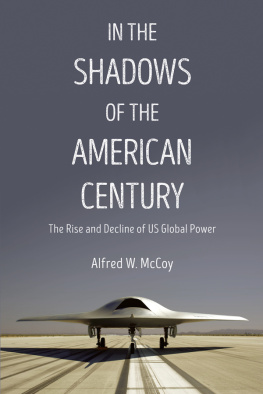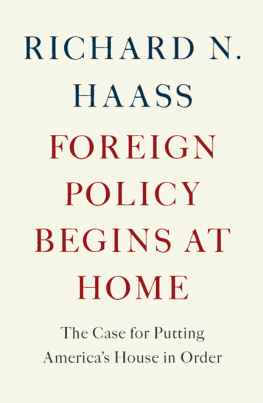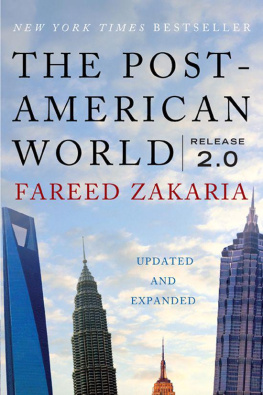THE RISEAND DECLINE OF THE AMERICAN EMPIRE
The Rise and Decline of the American Empire
Power and its Limits in Comparative Perspective
GEIR LUNDESTAD
Norwegian Nobel Institute


Great Clarendon Street, Oxford OX2 6DP
Oxford University Press is a department of the University of Oxford.
It furthers the Universitys objective of excellence in research, scholarship,
and education by publishing worldwide in
Oxford New York
Auckland Cape Town Dar es Salaam Hong Kong Karachi
Kuala Lumpur Madrid Melbourne Mexico City Nairobi
New Delhi Shanghai Taipei Toronto
With offices in
Argentina Austria Brazil Chile Czech Republic France Greece
Guatemala Hungary Italy Japan Poland Portugal Singapore
South Korea Switzerland Thailand Turkey Ukraine Vietnam
Oxford is a registered trade mark of Oxford University Press
in the UK and in certain other countries
Published in the United States
by Oxford University Press Inc., New York
Geir Lundestad 2012
The moral rights of the author have been asserted
Database right Oxford University Press (maker)
First edition published 2012
All rights reserved. No part of this publication may be reproduced,
stored in a retrieval system, or transmitted, in any form or by any means,
without the prior permission in writing of Oxford University Press,
or as expressly permitted by law, or under terms agreed with the appropriate
reprographics rights organization. Enquiries concerning reproduction
outside the scope of the above should be sent to the Rights Department,
Oxford University Press, at the address above
You must not circulate this book in any other binding or cover
and you must impose this same condition on any acquirer
British Library Cataloguing in Publication Data
Data available
Library of Congress Cataloging in Publication Data
Data available
Typeset by SPI Publisher Services, Pondichery, India
Printed in Great Britain
on acid-free paper by
MPG Books Group, Bodmin and Kings Lynn
ISBN 9780199646104
1 3 5 7 9 10 8 6 4 2
Preface
In most of my academic writings I have focused on various aspects of the role of the United States in the world after 1945. While it is difficult to compete with the many American historians who write about US foreign policy, based on a lifetime of study and living in the country, perhaps we foreign historians may make an advantage of our inevitable shortcomings. Foreign policy is, by definition, policy toward some outside party; we are this outside party. We foreigners may be particularly sensitive to the receiving endthose other countries that the United States is dealing with.
Americans have a tendency to assume that the United States is unique. America is built on this belief. John F. Kennedy referred to our right to the moral leadership of this planet. Ronald Reagan affirmed that The American dream livesnot only in the hearts and minds of our countrymen, but in the hearts and minds of millions of the worlds people in both free and oppressed societies who look to us for leadership. As long as that dream lives, as long as we continue to defend it, America has a future, and all mankind has reason to hope. In his inaugural address, Barack Obama spoke to the entire world from the grandest capitals, to the small village where my father was born: know that America is a friend of each nation and every man, woman, and child who seeks a future of peace and dignity, and we are ready to lead once more.
Foreigners have a natural skepticism of such claims to specialness. None expressed this better than that close friend of the United States, Winston Churchill, when in 1945 he was faced with yet another American lecture about the evils of power politics: Is having a Navy twice as strong as any other power power politics? Is having an overwhelming Air Force, with bases all over the world, power politics? Is having all the gold in the world buried in a cavern power politics? If not, what is power politics? Every country is of course unique in certain ways; it also resembles other countries in many ways. Detailed study, not faith, can tell us how special a country really is.
Three comparative questions have long fascinated me. The first is the relative strength of the United States. How strong has the United States really been in the years after the Second World War, and how strong is it today? Strength is a relative term, and the basis of comparison will be both other countries and earlier periods in the recent history of the United States. My conclusion is that the United States has clearly been the most important power since 1945. Predictions that the Soviet Union, Japan, and the European Union would come to surpass the US have not proved correct. Now China is definitely the main challenger. It may well happen that the size of Chinas economy will surpass that of the United States in the course of surprisingly few years. The United States is undoubtedly in relative decline. China and several other leading countries are growing much faster than the US; Americas debt is piling up; the effects of its still vast military lead are smaller than Washington had hoped, as we have seen in Afghanistan and Iraq. Nevertheless, on a per capita economic basis, in military strength, and in the importance of its allies, China will continue to lag far behind the United States.
The second question is the expansion of the United States. Militarily, politically, economically, and culturally the United States expanded even more than Britain had done in its imperial heyday. What distinguishes Americas expansion from the expansion of other Great Powers? I have long argued that the American version of empire was an empire by invitation, particularly in crucial Western Europe. This is a further effort to explore the nature of the expansion of the United States. My conclusion on this point is that while invitations are still being issued to the US (related to the first point), an American empire by invitation hardly exists any longer. If it does, it is primarily in East Asia, and in much more modified form than in Americas strongest decadesafter 1945 in Western Europe, and again, in the 1990s, in Central and Eastern Europe. However, despite its decline, the United States is still the only truly global superpower. Others, like China, are becoming increasingly global economically, but in most other respects they are still primarily regional. Nevertheless, in every part of the world, the US role is limited by at least one major regional power.
The third question is the paradoxical nature of power in international relations. What could the United States actually achieve? It is easy to demonstrate both the power and the defeats of a Great Power, even a superpower. The United States had been an empire; it still dominated the international structure; at the same time it suffered significant setbacks. How do these aspects fit together? Throughout history, empires have risen and fallen. Changes could be very dramatic. One day the Soviet Union was the worlds second leading power; the next it was gone. The conclusion here is that while no power has ever been omnipotent or more successful than the United States, a whole array of local factors has come to take on ever greater importance. Globalization is accompanied by fragmentation in a very complex mixture, and even very small groups can now offer serious resistance against the mighty United States. The present account is a tentative discussion of these complex questions.
Next page

